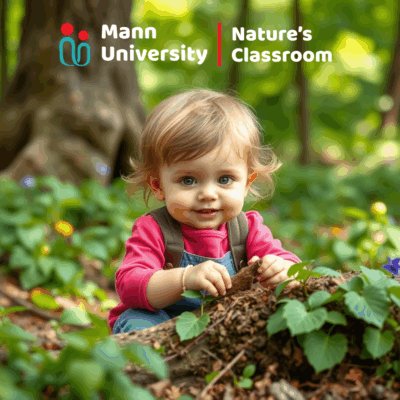
The Importance of Outdoor Learning and Environmental Awareness in Early Development
Nature's Classroom:
A One-Month Developmental Program for 22-Month-Old Children

The period around 22 months of age represents a crucial phase in a child’s developmental journey, marked by rapid growth across all domains. During this time, experiences with the environment play a pivotal role in shaping brain architecture and laying the groundwork for future learning. Early interactions with the natural world are particularly significant, establishing a foundation for lifelong learning, fostering a sense of responsibility towards the environment, and contributing to overall well-being. Research indicates that the formative years are a sensitive period for the development of values and habits. Positive engagements with nature during this stage can instill a lasting appreciation for the environment and encourage behaviors that are mindful of ecological principles. Furthermore, studies have demonstrated a strong connection between interaction with nature and enhanced cognitive and physical development in young children.
Outdoor learning offers a multitude of holistic benefits that extend beyond mere physical activity. Engaging with the outdoors significantly contributes to emotional regulation, the development of social skills, and cognitive growth. Evidence suggests that outdoor play is linked to reduced stress levels, improved mood, and enhanced concentration. The social interactions that naturally occur during outdoor play also provide valuable opportunities for toddlers to develop communication skills, learn to cooperate with others, and practice resolving conflicts. Recognizing the profound impact of nature on early development, this program introduces the concept of “Nature’s Classroom” as an comprehensive and engaging approach to learning specifically tailored for toddlers around 22 months old. This framework aims to harness the power of the natural world to foster holistic development and cultivate an early appreciation for environmental stewardship.
Developmental Milestones of a 22-Month-Old: A Foundation for Nature-Based Learning
At approximately 22 months, children typically reach several key developmental milestones across various domains, which serve as a crucial foundation for engaging in nature-based learning experiences.
Physically, toddlers at this age exhibit increased gross motor skills, demonstrating proficiency in walking, running, and often attempting to climb. They are also refining their fine motor skills, showing greater dexterity in manipulating objects and engaging in activities like stacking. The heightened mobility and eagerness to explore their physical capabilities make outdoor environments ideally suited for supporting their physical development. The varied terrains and natural obstacles found outdoors challenge and enhance their gross motor skills, including balance, coordination, and strength.
Intellectually and cognitively, 22-month-olds are experiencing rapid language development, with an expanding vocabulary and the ability to understand simple instructions. They display a growing sense of curiosity about the world around them and are beginning to engage in basic problem-solving. Their burgeoning intellectual curiosity can be readily stimulated by the novelties and sensory richness inherent in the natural world. The outdoors presents a wealth of stimuli – new sights, sounds, smells, and textures – that provide abundant opportunities for learning and exploration, thereby fostering cognitive development through direct, hands-on experiences. Simple activities, such as identifying familiar objects outdoors or participating in basic scavenger hunts, align with their current cognitive abilities.
Emotionally and spiritually, children around this age are developing a stronger sense of self-awareness and expressing a wider range of emotions. They are also starting to show early signs of empathy. Nature provides a calming and emotionally supportive environment where toddlers can explore and express their feelings. The diverse sensory experiences offered by nature can have a soothing effect, reducing stress and anxiety. This relaxed atmosphere can encourage toddlers to express their emotions more freely and begin to develop healthy strategies for managing them.
Linguistically, toddlers at this stage are typically using more words and starting to form short sentences. They are also demonstrating improved comprehension and responsiveness to language. The natural world offers a rich and engaging context for language development, introducing new vocabulary related to plants, animals, and various natural phenomena. Engaging with nature provides concrete examples for new words and concepts. Caregivers can effectively support language development by labeling objects, describing actions, and asking questions related to the natural environment. Discussions about colors and textures observed in nature further contribute to their linguistic growth.
Creatively, 22-month-olds are increasingly engaging in imaginative play, exploring different materials, and expressing themselves through various forms of art. Nature provides an inexhaustible source of inspiration and materials for fostering creativity and imaginative play. Natural elements such as leaves, sticks, stones, and mud can be utilized in countless ways to encourage imaginative scenarios and artistic expression. Activities like Play-Doh nature impressions and creating art with sidewalk chalk are well-suited for this developmental stage.
Morally and socially, toddlers are beginning to grasp the concepts of sharing and turn-taking. They are also interacting more with their peers and showing early indications of empathy. Outdoor activities naturally facilitate social interactions and the development of early moral concepts like sharing and kindness. Many outdoor games and explorations involve collaboration, the sharing of resources, and taking turns , all of which are essential for developing social skills and understanding fundamental moral principles. Caregivers play a crucial role in guiding these interactions and reinforcing positive social behaviors.
Culturally, while direct understanding of diverse cultural perspectives is still emerging at this age, nature-based activities can serve as an initial platform for introducing the idea that different cultures may have varying relationships with the environment and express emotions in diverse ways. Stories, songs, and art from different cultures often feature nature as a central theme. Incorporating these elements into the program can provide early exposure to various cultural viewpoints and foster an initial appreciation for the diverse ways humans interact with the natural world.
Thematic Framework: Nature’s Classroom – Benefits of an Outdoor, Nature-Focused Approach
Adopting nature as the primary learning environment for toddlers around 22 months old offers numerous advantages that support their holistic development. The natural world provides a rich and dynamic setting that caters to their innate curiosity and drive for exploration.
Nature’s diverse sensory landscape is particularly beneficial, offering a wide array of stimuli that engage all five senses. This multisensory environment provides rich and varied input that directly supports brain development and learning through active exploration. The multitude of textures, colors, sounds, smells, and tastes encountered in nature directly engage a toddler’s senses, leading to enhanced sensory processing and cognitive development. This hands-on exploration fosters a deeper and more intuitive understanding of the world around them.
Outdoor play is fundamental for supporting physical health and the development of gross motor skills. The expansive freedom of outdoor spaces encourages a high level of physical activity, which is essential for the healthy development of gross motor skills and overall physical well-being. Unlike the limitations of confined indoor areas, the outdoors offers ample room for running, jumping, climbing, and balancing, activities that are crucial for building strong muscles, improving coordination, and fostering a strong sense of body awareness.
The natural world is inherently full of wonders that spark curiosity, encourage discovery, and provide opportunities for developing problem-solving skills. Encountering new plants, insects, or natural phenomena naturally prompts questions and encourages toddlers to actively explore their surroundings. Even simple activities, such as attempting to build a dam in a puddle or engaging in scavenger hunts to find specific natural items, involve basic problem-solving skills and foster a sense of accomplishment.
Spending time immersed in nature has a demonstrably calming and restorative effect on toddlers, significantly contributing to their emotional well-being and resilience. The rich sensory input and open spaces characteristic of natural environments can help to reduce stress hormones and promote feelings of calm and relaxation. This positive emotional state supports overall well-being and facilitates the development of crucial emotional regulation skills.
Furthermore, early positive experiences with nature can cultivate a fundamental sense of care and responsibility towards the environment from a remarkably young age. By engaging with nature in ways that are both positive and meaningful, toddlers begin to form an emotional connection with the natural world. This early connection can lead to a greater understanding of environmental issues as they grow and a stronger motivation to protect the planet in the future.

Not a member yet? Register now
Are you a member? Login now